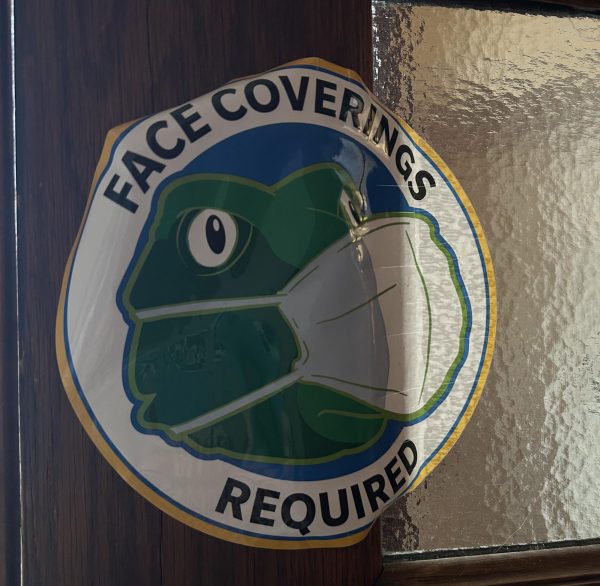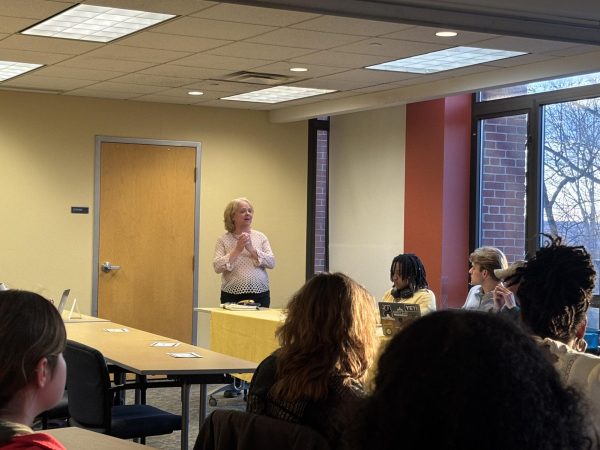Glennon receives award after water policy talk
Robert Glennon helps reporters, government officials, academics and the public understand water policy. After his lecture entitled “Our Thirst for Energy in a Warming, Water-Stressed World,” was finished, Glennon was awarded with Allegheny’s first Ewalt Environmental prize
The prize was created by Henry Ewalt, ’62, and his wife Mary. The Environmental Science and Sustainability department at Allegheny selected Glennon to receive the prize.
“(The department) concluded that he was a leader in the environmental sciences, not only with respect to all of the statistics that he quoted, but also with respect to the potential solutions,” Henry Ewalt said. “And that’s what we’re really interested in, creative solutions.”
Mary Ewalt said Glennon was best fit to receive the prize because of his work in raising awareness about the issues surrounding water policy.
“That is the purpose of the prize, and the actions of (Glennon),” she said.
Glennon is the Regents’ Professor and the Morris K. Udall Professor of Law and Public Policy in the James E. Rodgers College of Law at the University of Arizona. He also advises corporations and governments on water policy challenges. His book “Unquenchable: America’s Water Crisis and What To About It” won the 2010 Rachel Carson Book Award for Reporting.
To start, Glennon began by discussing how changes to the United States’s water pricing system will impact the public’s behavior — using shower length as an example.
“What if you had to pay for that shower by the minute?” Glennon asked. “That’s what I’m arguing tonight.”
Glennon continued by describing the national and global dimensions of the water crisis, including climate change’s impact on the topic as well.
Glennon said that out of a global population of 7.8 billion people, 1.1 billion people do not have access to safe drinking water. He said over 1.8 million people die from cholera, a bacterial disease often caught by drinking unsafe water, each year.
“The sad part is, most of those that die are children,” Glennon said.
He added the global population was expected to rise to 9.8 billion people by 2030, which is expected to add stresses to a system already laboring under its fair share of such difficulties.
Glennon described how the rising sea levels from climate change would threaten low-lying population centers such as Miami, Florida and the low-lying country of Bangladesh. Thus, the world could see itself trying to support more people with less land to do so.
“Let me put this into perspective,” Glennon said. “The horror in Syria displaced three million refugees. That’s 10 times that amount.”
In the United States, Glennon said, the western portion of the country is dealing with severe water shortages, as the cumulative water demand far outstrips the supply in the area. The imbalance between water access holders and water supply has led to developments such a legal distinction between paper rights and wet water rights.
“Think about that,” Glennon said. “There are more rights to the water than there is water.”
One of the main problems with water policy is the high demand for water, Glennon said. A high component of this demand is from agricultural operations, though activities such as power generation can also be heavily water-intensive. As an example, Glennon described how hydroelectric installations like the Hoover Dam rely on a minimum water pressure to function.
“Guess what?” Glennon asked. “If there’s no water, you don’t get power.”
Glennon noted the need to develop renewable forms of energy and suggested one challenge to the expansion of such technologies — the accelerated demand for water these alternative methods require to function.
For example, Glennon said thermal solar power requires more energy than standard energy production methods like coal or natural gas.
“It takes a lot of energy to produce water. It takes a lot of water to produce energy,” Glennon said.
Glennon also cited National Hockey League stadiums and internet server farms as heavy water draws many consumers did not think about.
“We used to fret about energy shortages, but water lubricates the American economy just as oil does,” Glennon said.
Glennon offered potential solutions and categorized them as real — ones that work — and surreal — ones that will not work.
Real solutions included conservation and altering current methods of water pricing, while surreal solutions included cloud seeding and complicated diversion systems.
Glennon said he believed the world had the potential to fix such problems.
“Now, what is needed more than anything else is the moral courage and the political will to act,” Glennon said.









